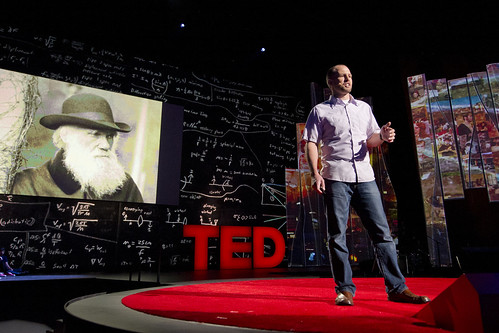Photo: Duncan Davidson
Aaron Reedy starts by taking us on a quick tour of evolution, natural selection and Darwin. But what’s more interesting than what we know, he adds, and the question all curious students ask him: How do we know all this? The best way to answer this question is to give examples:
Fossils: “We’ve seen snakes with legs; we’ve seen whales with legs; horses with toes; fish with fingers,” he says, adding: “We all have a vestigial tail. We’re sitting on it right now.”
Living creatures: Darwin famously looked at finches. He thought change happened so slowly we must not be able to see them. But a group of scientists in the Galápagos have shown that beak size in finches can shift over seasons, to reflect the kinds of fuel sources are available.
Genetic technology: We’ve isolated the gene responsible for zebra finches learning to sing, for young mice learning complex visual patterns. The same gene, FoxP2, is also in the brains of human children learning to imitate adult speech. “Evolution doesn’t invent things from scratch,” says Reedy. “It merely tinkers with the existing machinery of life.”
Tracking: Reedy tells of an experiment run in Trinidad over the period of 11 years. Scientists tested to see how guppies responded to different styles of predators, and found that they evolved very specifically to reproduce either earlier or later in life to provide the least appealing source of food. Significant evolution occurred in just over a decade.
“One of the knocks on evolution biology is that it’s not an experimental science,” says Reedy. “But that’s not true. You can test natural selection if you come up with clever ways.” And, he concludes. “While we meet resistance when we teach evolution, how we know what we know is just as interesting as what we know.”
See also: Aaron’s 2009 presentation at TEDxSMU in Dallas, where he describes a 1,000-mile kayak trip he made down the Mississippi River in the name of inspiring his students.

Comments (1)
Pingback: Science & Students: Aaron Reedy | Chicago Ideas Blog